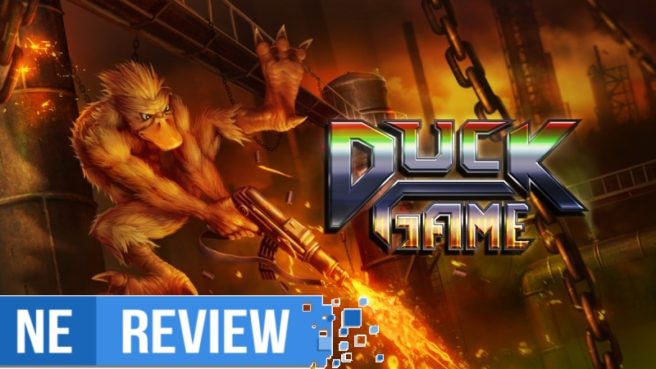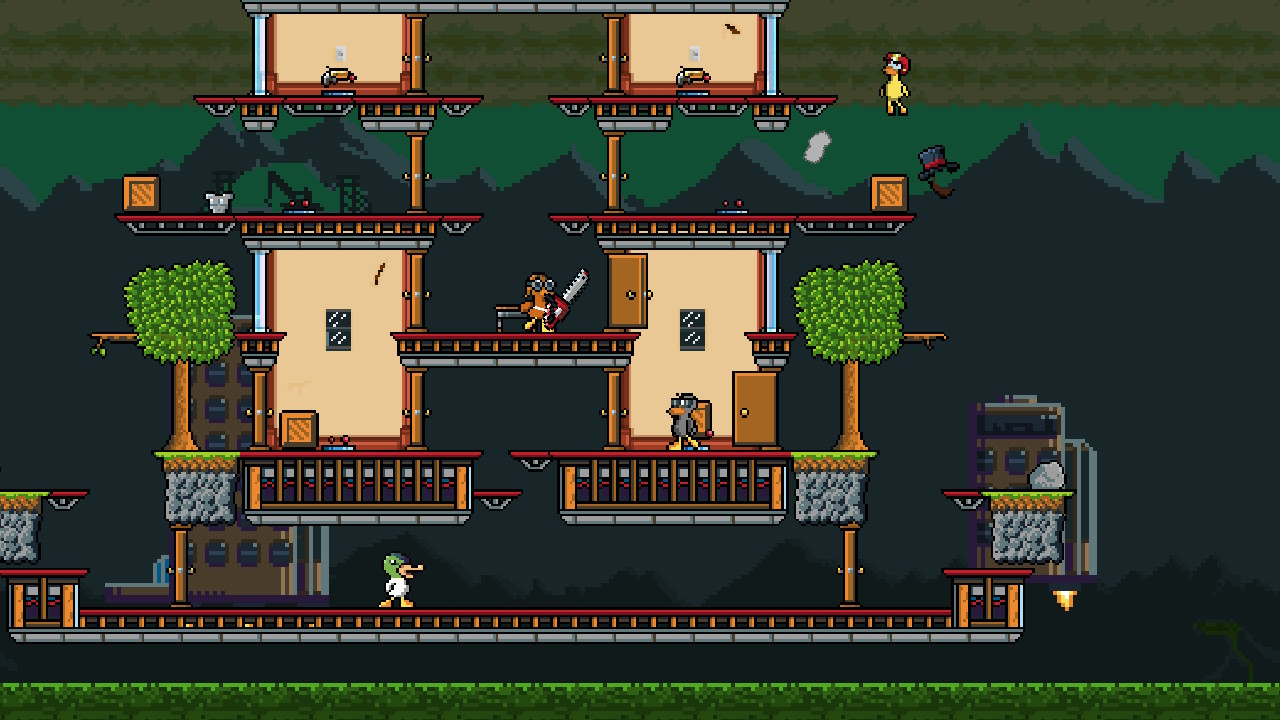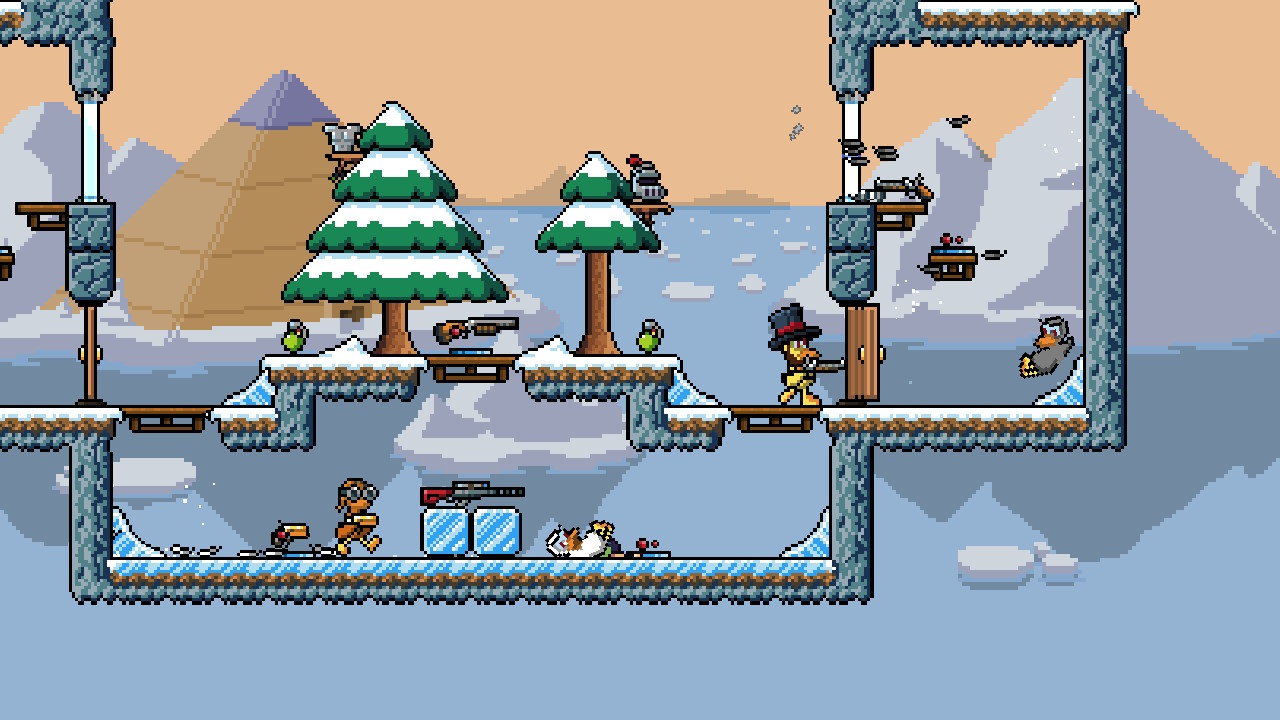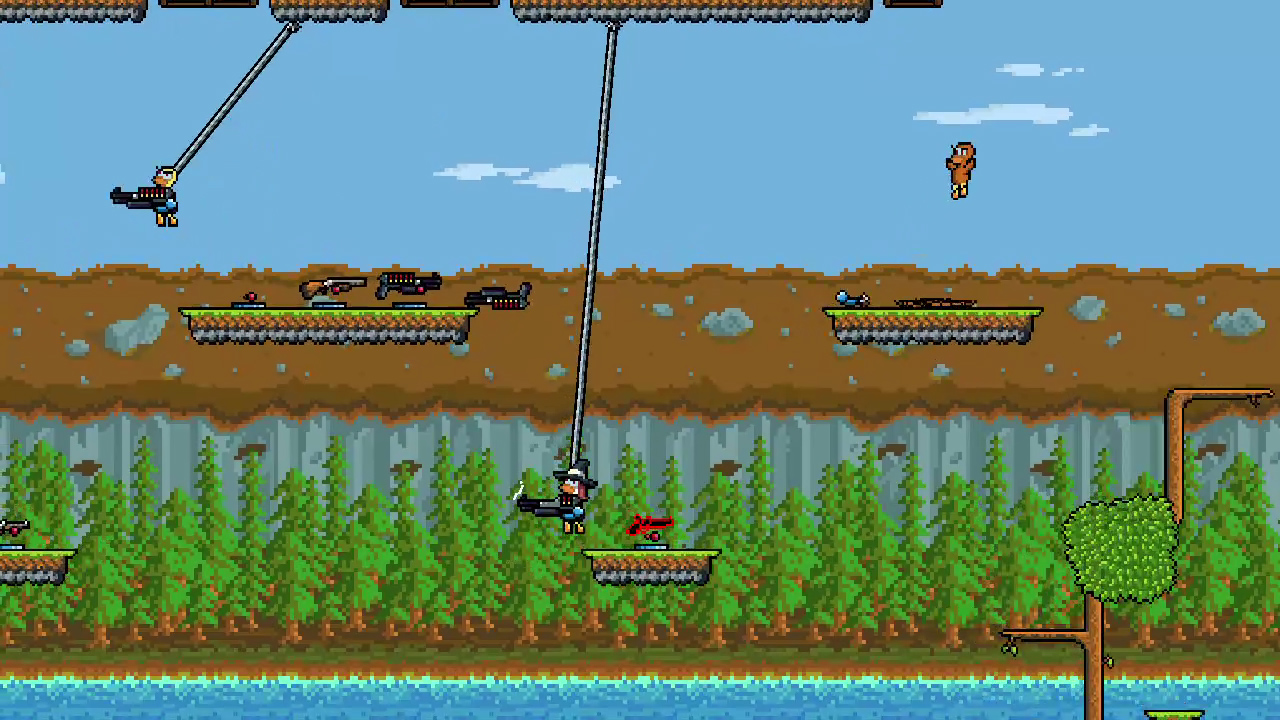[Review] Duck Game
System: Switch (eShop)
Release date: May 2, 2019
Developer: Landon Podbielski
Publisher: Adult Swim Games
Duck Game has definitely taken its time finding its nest on Switch. First developed as an Ouya exclusive all the way back in 2014, it’s seen numerous upgrades and re-releases over the years, including the announcement of a version for Nintendo’s hybrid console in 2017. After a two years’ incubation, this chaotic brawler has finally hatched onto the Switch. But after all this time, is Duck Game still all it’s quacked up to be?
Duck Game’s bread and butter has to be its multiplayer mode. In local and online multiplayer, up to four player-controlled bloodthirsty ducks are dropped into an arena with a single goal in each round: be the last duck standing. Controls are simple enough – d-pad or control stick to move, X to pick up and throw stuff, Y to attack, B to jump, and most importantly of all, A to quack. Yes, this game allows you to quack at any and every moment. Granted, quacking serves no practical gameplay purpose whatsoever, but it doesn’t need to when it sounds so satisfying. It’s the perfect taunt.
Movement is fast and a touch floaty, so you’ll have to be careful – ducks aren’t particularly resilient creatures, so it takes only a single hit to spell the end of the line for your avian aggressors. You’ll need to zip across the massive stages and take full advantage of their plentiful guns and gimmicks to survive. Some levels feature portals that automatically transport you all around the stage, while others are coated with ice, and others still are littered with fiery pitfalls. Each stage is also packed with an incredible variety of weaponry that no one in their right mind should let ducks handle – from machine guns to chainsaws to swords to grenades to banana peels, there’s a vast amount of ways for your ducks to dish out death to one another.
Generally, each match consists of a mad dash across the map to grab the best weapons, before devolving into a feathery massacre. By default, games are divided into sets of ten rounds with each taking place in a different level, and with the first duck to reach ten kills being declared the winner. Ten rounds might sound like a lot, but between the insane stage designs, weapon variety, and the one-hit kill mechanics, matches move at a briskly hectic pace. It’s a bit like Smash Bros., but with significantly more ducks and firearms. Multiplayer is the game’s primary focus for a reason – it’s incredibly quick and hilariously chaotic, making for an exemplary multiplayer experience that’s perfect for parties.
Multiplayer can be played locally with friends on a single console, wirelessly with several Switches, or online with players around the world. The online multiplayer is definitely a solid experience, offering perfect controls and performance with zero lag or frame rate drops even in full four-player matches. Matchmaking times vary, ranging between being instantaneous and taking a few minutes to find a proper lobby. However, no matter how solid the online performance may be, it can’t match the social hilarity of playing the game locally. Local multiplayer is easily the best way to experience what Duck Game has to offer. The novelty of ducks with guns shooting each other never gets old, and it’s only amplified when playing with a friend in the same room to quack along with the absurdity of the whole game. Disappointingly, there’s no option to play against AI opponents in the multiplayer mode, so if you’re playing the game in portable mode and away from reliable internet or people to play with, you’re unfortunately relegated to its single player offerings.
There’s a decent amount of content on offer for those looking to experience the game solo. This comes mainly in the form of the game’s Challenge Arcade, a group of short levels each focused on individual gimmicks. Many of these are merely glorified tutorials – there’s one stage about learning how to use the hand gun, another about the death ray, yet another about the chainsaw, and so on. These stages can be clever in their own right, but they’re a far cry from the delightful chaos of the multiplayer matches. On the contrary, many of them are strangely slow-paced. They ditch the speedy madness of the multiplayer battles in favor of presenting distinct puzzle-like room setups that force you to really think about every bullet you fire.
Unfortunately, the slower pace of these challenge rooms doesn’t always complement the game’s underlying multiplayer-focused mechanics. For instance, the floaty movement can work well in the frenetic multiplayer matches, but it doesn’t mesh so well with the precision required in the tougher single player challenges. Also, these levels make me wish that the game had some sort of indication of your current ammo – as it is, you only find out you’re out of ammo when you’re stuck mashing the Y button as you slowly realize that your deadly duck has squandered their magazine. When the challenges focus so much on resource management, it would have been nice to actually know how much resources you have at any given moment. This forces some frustrating trial-and-error approaches to the more difficult levels.
Regardless, you’ll be amply rewarded for performing well in the various modes. The game rewards you for playing the multiplayer mode with a constant barrage of accessories that can be used to decorate your room, which can be shown off in the lobbies in online and local matches. In turn, you’ll receive tickets for completing the challenge levels, which can be spent on gameplay modifiers for local multiplayer such as anti-gravity modes and explosive debris. But perhaps more importantly, tickets may also be used to purchase hats that can be worn throughout all of the game’s local and online modes. Now, these hats may be completely cosmetic with no real gameplay improvements, but how could you argue that wearing a top hat doesn’t enhance your Duck Game experience?
In addition to the single-player challenges, the game comes equipped with its very own custom map editor. This feature is surprisingly robust: you can select from a huge variety of tiles to use for platforms and backgrounds and populate your creation with the same stage hazards that made each of the main levels unique. Give it the time it needs, and it can be an effective tool in creating the duck adventures of your dreams. However, it’s not the snappiest tool to work with – seriously, why do you have to lay down every single background and platform tile individually? Why can’t you select the type of tile you want and lay it down in bulk, or select a single default background to use instead of having to manually paint the whole thing? It has the potential to create some truly magnificent levels, but the slowness makes it more tedious than it ought to be.
When it comes to its presentation, Duck Game keeps it simple. Its basic pixel art won’t win any awards for artistic excellence, but it’s charming in its own right. The simplistic duck designs get the job done, and the larger character portraits really pop with a colorfully cartoonish retro style. The music continues this old-school vibe with a bopping chiptune soundtrack that is often reminiscent of classic Genesis games like Streets of Rage. Of course, it never reaches the same musical excellence of those classic titles, but Duck Game’s music does a fine job complementing the madcap action.
Unfortunately, Duck Game can be technically rough around the edges. Its performance is solid, but there’s a lot of small little glitches – mechanical quirks like music randomly cutting out and screens distorting during stage transitions are abundant. These aren’t game-breaking issues, but they do add up over time and diminish the game’s otherwise clean and quirky aesthetic. What’s worse is that there actually are game-breaking bugs, as Duck Game crashed twice during my time with it. Similarly, in the level editor, if you try to load a level without manually registering a spawn point (something that the game doesn’t actually tell you to do) you’ll be greeted with a black screen and music that haphazardly fades in and out. Issues like these were too infrequent to negatively affect the enjoyment I had with the game on the whole, but their presence should be noted.
Regardless of all these gripes about the additional modes, it doesn’t change that Duck Game is a prime example of a game that does one thing and does it incredibly well. It’s an exciting multiplayer party game complemented by its extensive selection of collectible headgear and accessories. Duck Game is pure and simple fun. Perhaps the other modes don’t hold up as well by comparison, but they’re simply the appetizers to the delectable main course of the multiplayer.
The Verdict
If the many other multiplayer offerings on Switch are too lacking in ducks for your taste, then Duck Game is what you’ve been waiting for. It’s fast, frenetic, and fantastically weird – I never knew how badly I wanted to play a game about ducks with chainsaws dressed as Abraham Lincoln. Whether you’re playing locally at a rooftop party or you’re ravaging the world’s duck population online, Duck Game is a wonderfully madcap multiplayer experience. Maybe its technical gaffes and subpar single-player content can’t match its flagship mode, but it still excels at what it sets out to do: both locally and online, it’s among the standout local multiplayer experiences on Switch.
Duck Game review copy provided by Adult Swim Games for the purposes of this review.




